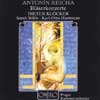Reicha Wind Concertos
Entertaining works from an individual voice given appropriately witty accounts
View record and artist detailsRecord and Artist Details
Composer or Director: Antoine(-Joseph) Reicha
Genre:
Orchestral
Label: Orfeo
Magazine Review Date: 11/2003
Media Format: CD or Download
Media Runtime: 59
Mastering:
Stereo
DDD
Catalogue Number: C170 021A

Tracks:
| Composition | Artist Credit |
|---|---|
| Concerto for Clarinet and Orchestra |
Antoine(-Joseph) Reicha, Composer
Antoine(-Joseph) Reicha, Composer Dieter Klöcker, Clarinet Milan Lajcik, Conductor Prague Chamber Orchestra |
| Introduction and Rondo for Horn and Orchestra |
Antoine(-Joseph) Reicha, Composer
Antoine(-Joseph) Reicha, Composer Milan Lajcik, Conductor Prague Chamber Orchestra Sarah Willis, Horn |
| Introduction and Variations on a Theme by Dittersdorf for Clarinet and Orchestra |
Antoine(-Joseph) Reicha, Composer
Antoine(-Joseph) Reicha, Composer Dieter Klöcker, Clarinet Milan Lajcik, Conductor Prague Chamber Orchestra |
| Theme and Variations for Bassoon and Orchestra |
Antoine(-Joseph) Reicha, Composer
Antoine(-Joseph) Reicha, Composer Karl-Otto Hartmann, Bassoon Milan Lajcik, Conductor Prague Chamber Orchestra |
Author: John Warrack
Reicha’s chamber music turns up in the catalogue quite often, his copious concertante and symphonic works rather less so. Three of those represented here do not have the quirky originality that can sound intriguing, sometimes merely eccentric, in the wind quintets, and are cast in the familiar forms which composers of his time (1770-1836) could turn out easily enough on demand for passing virtuosos. They are quite testing: Sarah Willis does well with with the bounding line of the horn Introduction and Rondo, and Karl-Otto Hartmann makes some drily witty points with the bassoon Theme and Variations. Though he has quite a lively time of it with the Dittersdorf Clarinet Variations, it is in the Clarinet Concerto that Dieter Klöcker is more fully engaged with a piece that represents something of a rescue operation.
Briefly, the music consists of two incomplete outer movements, which Eberhard Buschmann has reconstituted with what is clearly a good deal of ingenuity, particularly in the shaping of a distinctly eccentric first movement. He has also written a slow introduction before setting off on a final Rondeau which, as a facsimile in the booklet reveals, inspires Klöcker to lavish ornamentation on the theme even at its first appearance. The missing slow movement is replaced here by the Andante from the Third Concerto by Iwan Müller, the brilliant itinerant clarinet virtuoso who reformed the instrument, irritated most of his colleagues, and inspired a good many concertos, including this one of Reicha’s. His own Andante is an odd piece, capable of darting off in unexpected directions, but suitable enough for the purpose. It was scored by Meyerbeer. So this is a piece of patchwork, scarcely justifying Buschmann’s claim that it can stand beside the concertos of Spohr and Weber, though it is shot through with flashes of entertaining music.
Briefly, the music consists of two incomplete outer movements, which Eberhard Buschmann has reconstituted with what is clearly a good deal of ingenuity, particularly in the shaping of a distinctly eccentric first movement. He has also written a slow introduction before setting off on a final Rondeau which, as a facsimile in the booklet reveals, inspires Klöcker to lavish ornamentation on the theme even at its first appearance. The missing slow movement is replaced here by the Andante from the Third Concerto by Iwan Müller, the brilliant itinerant clarinet virtuoso who reformed the instrument, irritated most of his colleagues, and inspired a good many concertos, including this one of Reicha’s. His own Andante is an odd piece, capable of darting off in unexpected directions, but suitable enough for the purpose. It was scored by Meyerbeer. So this is a piece of patchwork, scarcely justifying Buschmann’s claim that it can stand beside the concertos of Spohr and Weber, though it is shot through with flashes of entertaining music.
Discover the world's largest classical music catalogue with Presto Music.

Gramophone Digital Club
- Digital Edition
- Digital Archive
- Reviews Database
- Full website access
From £8.75 / month
Subscribe
Gramophone Full Club
- Print Edition
- Digital Edition
- Digital Archive
- Reviews Database
- Full website access
From £11.00 / month
Subscribe
If you are a library, university or other organisation that would be interested in an institutional subscription to Gramophone please click here for further information.




